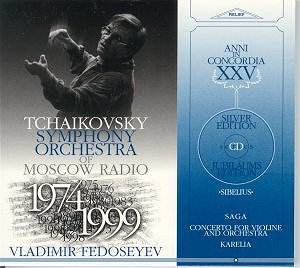I
have always found the Russian slant on Sibelius to be a promising
one. Rozhdestvensky's set of the symphonies (not yet on CD) and
his direction of the Moscow RSO in the classic Oistrakh recording
of the concerto (BMG-Melodiya), Sinaisky in the complete tone
poems (Harmonia Mundi Saison Russe LDC 288 015-017), Mravinsky
in the Seventh Symphony, all suggest a virile alchemy between
the two cultures even though the histories of the two countries
has been far from harmonious.
Fedoseyev
takes a broad line with En Saga which, while accentuating
its brooding poetry, compromises its dynamism and momentum. I
love this piece but at 19.42 this is too much of a good thing
... at least for a listening recommendation. This is a live concert
recording and the risks associated come home to roost in the last
few minutes when a persistent hacking cougher adds unwelcome punctuation.
I compared the Fedoseyev in En Saga with my reference version
Horst Stein/Suisse Romande (Decca 415 697-2) and the Sinaisky/Moscow
PO. Stein flies along at 16.15 while Sinaisky takes 17.45. Both
produce a more gripping effect though neither quite matches
the 1943 Furtwängler version (Berlin) on Music and Arts.
Tretyakov
(b.1946) has played in the West but his name does not have the
éclat of an Oistrakh or even a Kogan. Once again the joint
conception between conductor and soloist is broad in the Violin
Concerto. Oistrakh takes the work in 31.15 (BMG) while
Ferras and Karajan in 1965 took 33.23. Tretyakov has the advantage
of a one-off concert event lending the accustomed sense of occasion
while at the same time exposing the occasional rough edge. Vibrato
is not a problem he suffers from and things go very well. In fact
this is a satisfying version, for those liking their Sibelius
steady rather than rushed, without being specially outstanding.
The Concerto came from the same concert as the En Saga.
Fedoseyev
does like his Sibelius steady. Perhaps this is the inculcated
tradition. The Karelia Suite's famous allegro moderato
starts well with plenty of buzzing tension but when the ‘oompah’
main theme starts, the pace is excessively deliberate. The allegro
ma non tanto is taken at a cracking pace - really enjoyable.
The
recording is outstandingly clear and empowered.
Fedoseyev
recorded a cycle of Glazunov symphonies in the early 1980s. It
was issued in a Eurodisc boxed set of LPs. I wonder if Urs Weber
the producer of this excellent series will be able to persuade
the conductor and Relief to issue that cycle for the first time.
Meantime
if you like your Sibelius high wide and emphatic this disc is
for you.
Rob
Barnett
